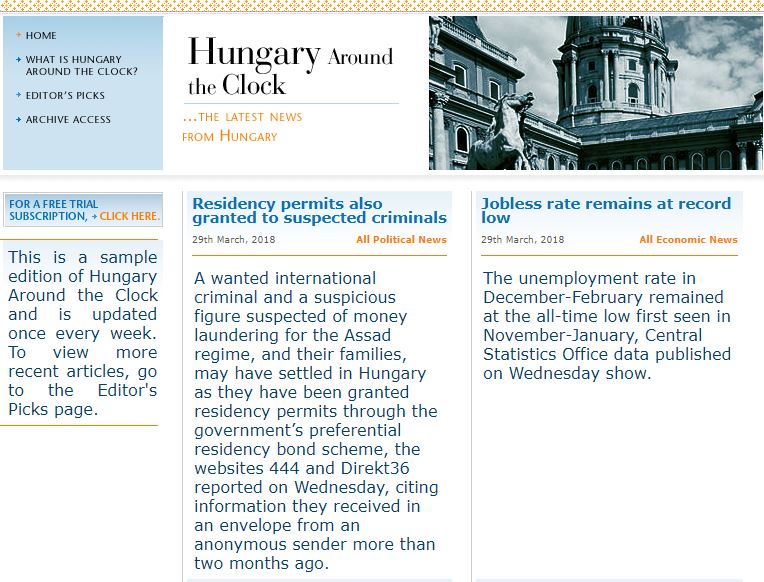Expats in Budapest Proliferating: Census Shows 25% of 6th District Residents in Capital Are Foreign Nationals
- 12 Oct 2023 3:56 PM
- Hungary Around the Clock

District mayor Tamás Soproni said it has become an unavoidable necessity for the local government to address its non-Hungarian citizens living in the district, and at the same time help them integrate.
The English pages of the newspaper include useful information for everyday administration.
It has been revealed how many people identify themselves as Roma in our country, but shockingly, many do not answer this question, reports Telex.
According to data from the Central Statistical Office (KSH), nearly 210,000 people identified themselves as belonging to the Roma ethnic group in the 2022 census. The numbers also show that, despite the government's previous anti-immigration rhetoric, the number of foreign citizens residing in Hungary continues to increase.
In last year's census, 209,909 people identified themselves as part of the Roma ethnic group. This is significantly less than those who gave the same response in the previous 2011 national census when 315,000 people identified as Roma.
However, in the 2001 census, the data was closer to the current figures, with 205,000 people identifying as Roma.
Of course, the explanation cannot be that there were 205,000 Roma in Hungary twenty years ago, as the number has more than doubled over the last decade, and more than 100,000 have disappeared since.
A much more plausible explanation, as evidenced by the official data released, is that there are a shocking number of people who do not answer questions about their ethnicity at all.
In the last census, nearly 1.1 million people chose not to provide such information about themselves.
The number of those who prefer not to disclose their ethnicity has drastically increased over the last 20 years. It is not easy to determine the reasons for this. It is also worth investigating whether this is related to the Fidesz-KDNP's identity politics, which has emphasized that only Hungarian ethnicity can be declared without risk over the past 10-15 years.
20 years ago, 527,000 people did not respond to the ethnicity question, in 2011, nearly three times as many, nearly 1.4 million, chose not to specify their ethnicity on the questionnaire. This number then decreased to 1.1 million in the last census, which is still significantly high.
Moreover, in 20 years, the number of those who choose not to answer the question about their ethnicity has more than doubled, while the country's population has decreased by about 600,000 during this period.
Historical memory also shows that they have always been at a disadvantage when they were counted.
Regarding this issue, Agnes Kende, a sociologist, wrote a comprehensive assessment in her article "How Many Roma Live in Hungary?" The essential claim is that we actually don't know how many Roma live in the country.
The large-scale "census of the Roma" conducted for the first time in Hungary in the 19th century and subsequent studies on the Roma population in the 20th and 21st centuries consistently counted hundreds of thousands more people than the censuses based on self-reporting.
"The gap between the numbers is a clear example of the situation of the Roma in Hungary, and it's not just about the fact that probably more people consider themselves Roma than actually admit it. When researchers include those who are considered Roma by their environment due to prejudice, they argue that it's important to know who the majority sees as Roma because they are segregated in schools, denied rental housing, and not allowed into evening entertainment venues.
In other words, most of the people perceived as Roma in one way or another by the majority are discriminated against by mainstream society. To understand the extent of this problem, it's not enough to know who identifies themselves as Roma; we also need to know the number of those presumed to be Roma," the researcher concluded.
Katalin Sztojka, a Roma activist from Kalocsa, stated: "It depends on who is asking them. If I ask them, of course, they say they are Roma. If a stranger asks them, they are afraid and wonder why they are being asked, why the authorities need to know, why the gas companies need to know whether they are Roma or not.
In Kalocsa, when it was necessary to register for the ethnic self-government election, 500 people registered as Roma, while in the 2011 census, only 3 people declared themselves as such, even though at least 2,000 Roma live in the city. People don't understand why this data is needed when historical memory shows that it has always worked to their disadvantage."
There are, of course, other reasons why not everyone reveals their origin: people of Roma origin who are born of mixed marriages or relationships may be seen as Roma by their surroundings based on their skin color, even if their identity plays a different role for them.
Conversely, Roma of Roma origin who have fully integrated into mainstream society may not be seen as Roma by their environment, causing them to disappear from the eyes of researchers, even though they may still have a strong Roma identity.
It is worth comparing the current numbers with previous research. According to a study led by sociologist István Kemény, in 1993, the Roma population was 482,000, making up 4.69% of the total population at that time.
The 2003 survey counted 540,000 Roma (with possible sampling errors ranging from 520,000 to 650,000), which represented 5.3% of the total population.
László Hablicsek's demographic estimate in 2007 put the expected number of Roma at around 658,000 for 2011 and between 733,000 and 814,000 for 2021. This is in line with the 2012 TÁRKI Household Monitor study, which reported an estimate of 620,000 to 680,000.
Since many people do not respond to the question about their ethnicity, the numbers for other ethnicities are also uncertain. Among the so-called domestic ethnicities, Germans are the most numerous, with over 140,000 people providing this response in 2022.
It is also likely that the number of Ukrainians in Hungary has increased in recent years, not only due to the Russian-Ukrainian war but because many guest workers have gone to other Central and Western European countries in the past few years, given Ukraine's less than rosy economic situation.
For decades, the number of foreign citizens in the country has been increasing, despite the Fidesz government's anti-foreigner rhetoric in all forms of media. Based on official census data, the trend is clear, with the number of foreign citizens in Hungary more than doubling to 217,000 in 20 years.
Furthermore, the 2022 census can be seen as one of the last moments of another era, as the Hungarian government adopted a new guest worker law this summer to more effectively regulate the process through which hundreds of thousands of new guest workers are expected to arrive in the country in the next few years.
Despite the labor shortage in Hungary, significant investments are coming into the country, and there have been instances of growing hostility in several places due to the presence of people coming from outside Europe to work in the new factories. This is happening even though police statistics do not support a strong trend of xenophobia.




























LATEST NEWS IN community & culture